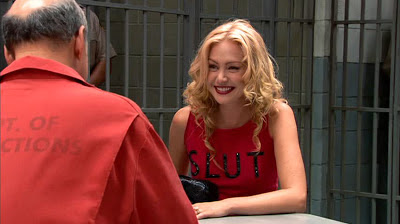First airdate: 21 December, 2003
Written by Chuck Martin
Directed by Jay Chandrasekhar
I owe “My Mother, the Car” an apology. In discussing “Charity Drive”, I basically claimed that, like “Charity Drive” and “Visiting Ours”, it was the third consecutive episode of Arrested Development that was certainly not a bad episode by any means, but simply not that great compared to the series when it was really firing on all cylinders, and for this I can only claim a faulty memory. Though I clearly recalled the content of the episode at a plot level, I had completely forgotten how damn funny it was, and in particular what a hell of a showcase it was for Jessica Walter’s Lucille Bluth, who makes the jump from dominating, emotionally detached matriarch to embodiment of pure domestic toxicity and outright evil. “You’re my third-least-favorite child”, she announces to the duly unimpressed Michael (“I can live with that”), and the precision of that line, and Walter’s declamatory, annoyed delivery, say all there is to say about this woman’s personality and relationship to her family.
Not that simply giving a strong focus to one character who doesn’t always get her fair share of time in the spotlight would be enough – season 3’s “Prison Break-In” is crammed with great Lucille moments, but it’s nevertheless probably the single worst episode in the entire series run – but in addition to the great work it does in deepening and enlarging Lucille, “My Mother, the Car” is pretty much an all-round solid episode: putting Lindsay and George Sr. together for the first time in a scene that doesn’t, honestly, do all that well by Jeffrey Tambor, though it’s pretty generous to Portia de Rossi, who nails the episode’s acerbic parody of a traditional sitcom lesson: “That’s all I ever wanted from you, Daddy: for you to spend money on me”, while wearing the SLUT shirt that will become a repeated part of her wardrobe for the very first time.
In fact, there’s a lot of terrific gag-writing here: George-Michael and Maeby seeing a trailer for French erotic thriller Les cousins dangereux, funny in itself, while setting up one of Michael Cera’s best early line deliveries, from before the show was using him to best effect: “I like the way they think”. There’s a one-minute flashback that lets the show play around with an overlapping joke that is, while obvious, pretty damn funny; Gob gets to bring back the under-appreciated recurring gag “…I don’t think so”; the show makes its first overt anti-Fox gag with a parody of that network’s trashy reality programming; and Tony Hale’s wide-eyed delivery of the line “Gob was just teaching me how to hit it with a hammer” is flawless.
But still, everything best about this episode comes down to Lucille and Michael, to Jessica Walter and Jason Bateman, who rarely got this kind of chance to play off each other. There’s really not a single bad moment in the whole episode between these two, with excellent banter, perfectly timed-gags (Lucille just barely pulling back from smacking Michael in the head with a vase couldn’t be more precise), and some of Bateman’s most subtle physical acting on the whole show, as he wrangles with the character’s awareness that Lucille is a manipulative terror, and the deep-down feeling of loyalty and affection that compel him to be a good son anyway. The “I’m a horrible mother” gag makes a fine button for the episode, but it’s even stronger, I’d say, in its first appearance, when it’s only Bateman who gets the slow reaction all to himself.
In a sense, then, this is once again an episode that works, like “Visiting Ours” and “Charity Drive”, primarily because it lets us spend time with the Bluth family and enjoy their interactions; the difference being that “My Mother, the Car” doesn’t attempt to humanise them but to demonstrate how massively fucked-up the family is. Physical abuse, drugging, lying, and an overt lack of genuine love and respect between any two characters are stressed at every turn, not warmth and happiness, and this brings me back to my original mistake: far from representing the show in its lower-key, idling phase, “My Mother, the Car” actually proves to be the moment where it fully embraces its own unique, blackhearted identity.
